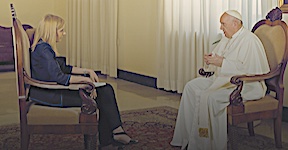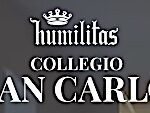Pope Francis grants interview to Argentinian news outlet ‘Télam’
Universal security is impossible without dialogue
”Exploitation is one of the causes of war. Another cause is geopolitical: territory control”, affirmed Pope Francis in an interview he granted to Argentinian news agency Télam — before Hamas’ terrorist attack on Israel.
The Pope touched on a wide range of topics, including crises and false messiahs, work, artificial intelligence, the synod and hope.
“I like the word ‘crisis’ because it contains inner movement.
But, the only way out from a crisis is upward, there is no easy way out. The way out is upward and never on our own. Those who intend to emerge alone from a crisis, turn the way out into a labyrinth that goes round and round”, the Pope said.
He stressed the importance of teaching young people to solve crises, because this helps them mature, and he warned against false messiahs.
“None of them can promise a solution to conflicts, unless it’s emerging upward from the crisis. And never on our own”.
Télam journalist Bernarda Llorente asked the Pope, “What is humanity lacking and what is there in excess?”.
Pope Francis replied by reminding her of the importance of “true values”.
He said “Humanity is lacking. Protagonists of humanity, who can display their human prominence, are lacking.
Sometimes I notice this inability to manage a crisis and to make one’s own culture come to the surface.
We should not be afraid to show the true values of a country. A crisis is like a voice telling us where to act”.
The Holy Father also noted that “a single way of thinking banishes human richness.
And human wealth must take into account three realities, three languages:
(1) the language of our mind, (2) the language of our heart and (3) the language of our hands.
In such a way that we think what we feel and what we do, we feel what we think and what we do, and we do what we think and feel. That is human harmony. If a person lacks any of those three languages, there is an imbalance that leads to a (1) single feeling, (2) a single pragmatism or (3) a single mindset. These are betrayals of humanity”.
Regarding work, the Pope stressed the importance of dignity in the workplace, and warned against exploitation.
“Work gives dignity to a person. The greatest betrayal of this path to dignity is exploitation.
I don’t mean the exploitation of the land to produce more, but the exploitation of the worker.
Exploiting people is one of the greatest sins. And to exploit them for one’s own benefit”.
The Pope also emphasized the need to protect workers’ rights so that work does not become slavery.
“When workers have no rights or are hired for very little time to be replaced later and to avoid paying social security contributions, they become slaves and the hiring person becomes an executioner”, he said.
Pope Francis also lamented that some people call him a “communist” when he speaks about his social encyclicals.
“I am not”, he said. He went on “The Pope reads the Gospel and speaks what is in the Gospel.
In the Old Testament, Hebrew law required that the widow, the orphan and the foreigner be taken care of.
If society takes care of these three situations, things will go well”.
Pope Francis was also asked for his opinion on technological development and its implications. “The key to cultural progress, such as Artificial Intelligence, is the ability of men and women to handle it, to assimilate it and to control it. Men and women are masters of Creation, and we must not give that up.
A person’s control over anything. Serious scientific change is progress. We must be open to that”, he replied.
On the subject of war, the Pope called for universal security achieved through dialogue.
“It is impossible to speak of social security unless it is a universal security, or in the process of becoming universal.
I believe that dialogue cannot be only nationalist. It must be universal, especially today with the advanced communication systems that we have. That is why I speak of (1) universal dialogue, (2)universal harmony, (3) universal encounter. And of course, the enemy of this is war”.
The Pope affirmed that the “exploitation” and “control of territory” are two causes of war, which are encouraged by dictatorships”.
Pope Francis spoke of the need to be “aware of one’s own identity in order to build peace and promote the common good”.
“You cannot dialogue with others if you are not aware of where you come from.
When two conscious identities come together, they can have a conversation and take steps toward an agreement, toward progress, walking together”.
Answering a question on the Synod and on what is happening in the Church in these times, the Holy Father said, “Since the Second Vatican Council, John XXIII had a very clear perception: the Church has to change. Paul VI agreed, just like the Popes that followed him. It’s not just a change of methods, it’s about a change of growth, in favor of the dignity of the human person.
This is the theological evolution of moral theology and all the ecclesiastical sciences, even in the interpretation of Scripture which have evolved according to the feelings of the Church. Always in harmony”.
The interview also touched on more personal matters, such as the Pope’s relationship with God.
He said “The Lord is a good friend. He has been good to me”. He said on an ability to laugh, “A sense of humor humanizes”. And on the importance of the virtue of hope, he added, “We cannot live without hope. If we were to extinguish our little daily hopes, we would lose our identity. We don’t realize that we live by hope. And theological hope is very humble, but it seasons our daily condiments”. Regarding his Apostolic Journeys, Pope Francis confided that he would like to travel to Argentina. “When it comes to more distant countries, I still haven’t visited Papua New Guinea”, he said.


